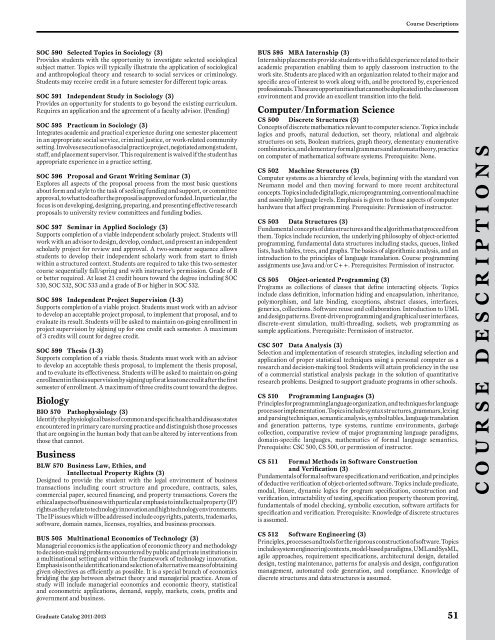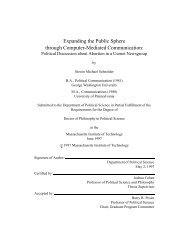Graduate Catalog 2011-2013 - SUNY Institute of Technology
Graduate Catalog 2011-2013 - SUNY Institute of Technology
Graduate Catalog 2011-2013 - SUNY Institute of Technology
You also want an ePaper? Increase the reach of your titles
YUMPU automatically turns print PDFs into web optimized ePapers that Google loves.
Course Descriptions<br />
SOC 590 Selected Topics in Sociology (3)<br />
Provides students with the opportunity to investigate selected sociological<br />
subject matter. Topics will typically illustrate the application <strong>of</strong> sociological<br />
and anthropological theory and research to social services or criminology.<br />
Students may receive credit in a future semester for different topic areas.<br />
SOC 591 Independent Study in Sociology (3)<br />
Provides an opportunity for students to go beyond the existing curriculum.<br />
Requires an application and the agreement <strong>of</strong> a faculty advisor. (Pending)<br />
SOC 595 Practicum in Sociology (3)<br />
Integrates academic and practical experience during one semester placement<br />
in an appropriate social service, criminal justice, or work-related community<br />
setting. Involves execution <strong>of</strong> a social practice project, negotiated among student,<br />
staff, and placement supervisor. This requirement is waived if the student has<br />
appropriate experience in a practice setting.<br />
SOC 596 Proposal and Grant Writing Seminar (3)<br />
Explores all aspects <strong>of</strong> the proposal process from the most basic questions<br />
about form and style to the task <strong>of</strong> seeking funding and support, or committee<br />
approval, to what to do after the proposal is approved or funded. In particular, the<br />
focus is on developing, designing, preparing, and presenting effective research<br />
proposals to university review committees and funding bodies.<br />
SOC 597 Seminar in Applied Sociology (3)<br />
Supports completion <strong>of</strong> a viable independent scholarly project. Students will<br />
work with an advisor to design, develop, conduct, and present an independent<br />
scholarly project for review and approval. A two-semester sequence allows<br />
students to develop their independent scholarly work from start to finish<br />
within a structured context. Students are required to take this two-semester<br />
course sequentially fall/spring and with instructor’s permission. Grade <strong>of</strong> B<br />
or better required. At least 21 credit hours toward the degree including SOC<br />
510, SOC 532, SOC 533 and a grade <strong>of</strong> B or higher in SOC 532.<br />
SOC 598 Independent Project Supervision (1-3)<br />
Supports completion <strong>of</strong> a viable project. Students must work with an advisor<br />
to develop an acceptable project proposal, to implement that proposal, and to<br />
evaluate its result. Students will be asked to maintain on-going enrollment in<br />
project supervision by signing up for one credit each semester. A maximum<br />
<strong>of</strong> 3 credits will count for degree credit.<br />
SOC 599 Thesis (1-3)<br />
Supports completion <strong>of</strong> a viable thesis. Students must work with an advisor<br />
to develop an acceptable thesis proposal, to implement the thesis proposal,<br />
and to evaluate its effectiveness. Students will be asked to maintain on-going<br />
enrollment in thesis supervision by signing up for at least one credit after the first<br />
semester <strong>of</strong> enrollment. A maximum <strong>of</strong> three credits count toward the degree.<br />
Biology<br />
BIO 570 Pathophysiology (3)<br />
Identify the physiological basis <strong>of</strong> common and specific health and disease states<br />
encountered in primary care nursing practice and distinguish those processes<br />
that are ongoing in the human body that can be altered by interventions from<br />
those that cannot.<br />
Business<br />
BLW 570 Business Law, Ethics, and<br />
Intellectual Property Rights (3)<br />
Designed to provide the student with the legal environment <strong>of</strong> business<br />
transactions including court structure and procedure, contracts, sales,<br />
commercial paper, secured financing, and property transactions. Covers the<br />
ethical aspects <strong>of</strong> business with particular emphasis to intellectual property (IP)<br />
rights as they relate to technology innovation and high technology environments.<br />
The IP issues which will be addressed include copyrights, patents, trademarks,<br />
s<strong>of</strong>tware, domain names, licenses, royalties, and business processes.<br />
BUS 505 Multinational Economics <strong>of</strong> <strong>Technology</strong> (3)<br />
Managerial economics is the application <strong>of</strong> economic theory and methodology<br />
to decision-making problems encountered by public and private institutions in<br />
a multinational setting and within the framework <strong>of</strong> technology innovation.<br />
Emphasis is on the identification and selection <strong>of</strong> alternative means <strong>of</strong> obtaining<br />
given objectives as efficiently as possible. It is a special branch <strong>of</strong> economics<br />
bridging the gap between abstract theory and managerial practice. Areas <strong>of</strong><br />
study will include managerial economics and economic theory, statistical<br />
and econometric applications, demand, supply, markets, costs, pr<strong>of</strong>its and<br />
government and business.<br />
BUS 595 MBA Internship (3)<br />
Internship placements provide students with a field experience related to their<br />
academic preparation enabling them to apply classroom instruction to the<br />
work site. Students are placed with an organization related to their major and<br />
specific area <strong>of</strong> interest to work along with, and be proctored by, experienced<br />
pr<strong>of</strong>essionals. These are opportunities that cannot be duplicated in the classroom<br />
environment and provide an excellent transition into the field.<br />
Computer/Information Science<br />
CS 500 Discrete Structures (3)<br />
Concepts <strong>of</strong> discrete mathematics relevant to computer science. Topics include<br />
logics and pro<strong>of</strong>s, natural deduction, set theory, relational and algebraic<br />
structures on sets, Boolean matrices, graph theory, elementary enumerative<br />
combinatorics, and elementary formal grammars and automata theory, practice<br />
on computer <strong>of</strong> mathematical s<strong>of</strong>tware systems. Prerequisite: None.<br />
CS 502 Machine Structures (3)<br />
Computer systems as a hierarchy <strong>of</strong> levels, beginning with the standard von<br />
Neumann model and then moving forward to more recent architectural<br />
concepts. Topics include digital logic, microprogramming, conventional machine<br />
and assembly language levels. Emphasis is given to those aspects <strong>of</strong> computer<br />
hardware that affect programming. Prerequisite: Permission <strong>of</strong> instructor.<br />
CS 503 Data Structures (3)<br />
Fundamental concepts <strong>of</strong> data structures and the algorithms that proceed from<br />
them. Topics include recursion, the underlying philosophy <strong>of</strong> object-oriented<br />
programming, fundamental data structures including stacks, queues, linked<br />
lists, hash tables, trees, and graphs. The basics <strong>of</strong> algorithmic analysis, and an<br />
introduction to the principles <strong>of</strong> language translation. Course programming<br />
assignments use Java and/or C++. Prerequisites: Permission <strong>of</strong> instructor.<br />
CS 505 Object-oriented Programming (3)<br />
Programs as collections <strong>of</strong> classes that define interacting objects. Topics<br />
include class definition, information hiding and encapsulation, inheritance,<br />
polymorphism, and late binding, exceptions, abstract classes, interfaces,<br />
generics, collections. S<strong>of</strong>tware reuse and collaboration. Introduction to UML<br />
and design patterns. Event-driven programming and graphical user interfaces,<br />
discrete-event simulation, multi-threading, sockets, web programming as<br />
sample applications. Prerequisite: Permission <strong>of</strong> instructor.<br />
CSC 507 Data Analysis (3)<br />
Selection and implementation <strong>of</strong> research strategies, including selection and<br />
application <strong>of</strong> proper statistical techniques using a personal computer as a<br />
research and decision-making tool. Students will attain pr<strong>of</strong>iciency in the use<br />
<strong>of</strong> a commercial statistical analysis package in the solution <strong>of</strong> quantitative<br />
research problems. Designed to support graduate programs in other schools.<br />
CS 510 Programming Languages (3)<br />
Principles for programming language organization, and techniques for language<br />
processor implementation. Topics include syntax structures, grammars, lexing<br />
and parsing techniques, semantic analysis, symbol tables, language translation<br />
and generation patterns, type systems, runtime environments, garbage<br />
collection, comparative review <strong>of</strong> major programming language paradigms,<br />
domain-specific languages, mathematics <strong>of</strong> formal language semantics.<br />
Prerequisite: CSC 500, CS 500, or permission <strong>of</strong> instructor.<br />
CS 511 Formal Methods in S<strong>of</strong>tware Construction<br />
and Verification (3)<br />
Fundamentals <strong>of</strong> formal s<strong>of</strong>tware specification and verification, and principles<br />
<strong>of</strong> deductive verification <strong>of</strong> object-oriented s<strong>of</strong>tware. Topics include predicate,<br />
modal, Hoare, dynamic logics for program specification, construction and<br />
verification, intractability <strong>of</strong> testing, specification property theorem proving,<br />
fundamentals <strong>of</strong> model checking, symbolic execution, s<strong>of</strong>tware artifacts for<br />
specification and verification. Prerequisite: Knowledge <strong>of</strong> discrete structures<br />
is assumed.<br />
CS 512 S<strong>of</strong>tware Engineering (3)<br />
Principles, processes and tools for the rigorous construction <strong>of</strong> s<strong>of</strong>tware. Topics<br />
include system engineering contexts, model-based paradigms, UML and SysML,<br />
agile approaches, requirement specifications, architectural design, detailed<br />
design, testing maintenance, patterns for analysis and design, configuration<br />
management, automated code generation, and compliance. Knowledge <strong>of</strong><br />
discrete structures and data structures is assumed.<br />
COURSE DESCRIPTIONS<br />
<strong>Graduate</strong> <strong>Catalog</strong> <strong>2011</strong>-<strong>2013</strong><br />
51
















